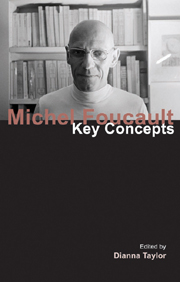12 - Practices of the self
from PART III - SUBJECTIVITY
Summary
Previous chapters have illustrated that for Foucault subjectivity is not a state we occupy but rather an activity we perform. Moreover, it is an activity that always takes place within a context of constraint. We constitute ourselves as subjects (we are enabled) by way of various “practices of the self”, which include activities like writing, diet, exercise and truth-telling. At the same time, we are constituted (we are constrained) in so far as the way in which we undertake these practices is shaped by institutions such as schools, courts of law, hospitals and the state security apparatus, as well as by the more general prevailing norms and values of the society in which we live.
Put differently, subjectivity is not distinct from but is rather formed in and through relations of power. There are not emancipatory institutions and norms that enable us, on the one hand, and oppressive or normalizing institutions and norms that constrain us, on the other; rather, we are simultaneously enabled and constrained by the same institutions and norms. We therefore find ourselves confronted with the task of figuring out when and how we are enabled and when and how we are constrained, of determining ways in which existing practices have the potential to loosen constraints and thus resist normalization, and of employing those practices not only for that purpose, but also in order to develop new and different practices – new and different ways of relating to ourselves and others. We need, in other words, to be able to reflect critically on the very process of becoming a subject.
- Type
- Chapter
- Information
- Michel FoucaultKey Concepts, pp. 173 - 186Publisher: Acumen PublishingPrint publication year: 2010
- 1
- Cited by

